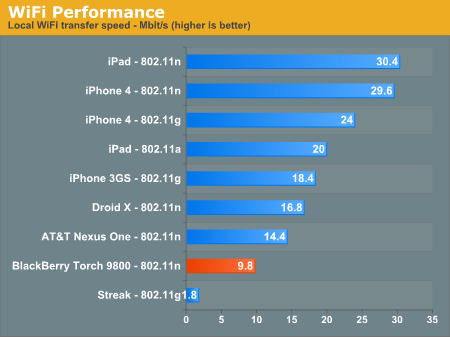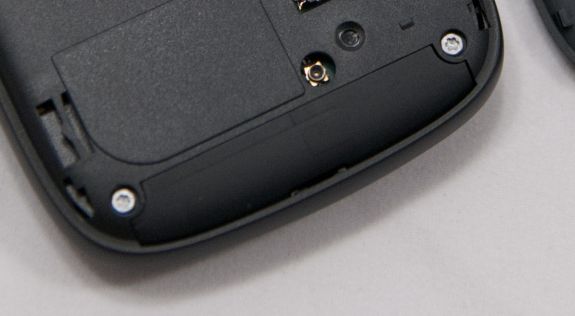BlackBerry Torch 9800 Review: Keeping RIM's Flame Alive
by Brian Klug on September 1, 2010 7:00 AM EST- Posted in
- Smartphones
- Torch
- BlackBerry
- Mobile
Signal
Signal attenuation due to holding devices is now a very present concern. As usual, we’ve measured the BlackBerry Torch in three different positions and found that the Torch drops around the same amount of signal as other devices, and of course less than the iPhone 4.
The cellular antenna on the Torch is at the bottom, as is the case for most devices. You can see the flex PCB which houses the antenna at the bottom quite easily right here. It's that different color black area at the bottom of the device:
Unsurprisingly, holding the device with the battery cover off and getting as much of my hand in contact with the insulated black surface of antenna as I can (something you wouldn’t ever do in regular use), I can make it drop as much as 21 dB. That's just an example of how getting super close to the radiative surface will attenuate signal - iPhone 4 style. We went through the usual gamut of tests and found that the Torch doesn't drop lots of signal, rather sticking to normal levels of around 15 dB cupped as tightly as possible with the back case on.
| Signal Attenuation Comparison in dB - Lower is Better | |||||||
| Cupping Tightly | Holding Naturally | On an Open Palm | |||||
| BlackBerry Torch | 15.9 | 7.1 | 3.7 | ||||
| Dell Streak | 14.0 | 8.7 | 4.0 | ||||
| Droid X | 15.0 | 5.1 | 4.5 | ||||
| iPhone 4 | 24.6 | 19.8 | 9.2 | ||||
| iPhone 3GS | 14.3 | 1.9 | 0.2 | ||||
| HTC Nexus One | 17.7 | 10.7 | 6.7 | ||||
As an aside, remember that you can quickly change the bar visualizations to numerical strength in dBm and back by holding alt and typing n m l l on the keyboard.

Like other BlackBerries, strength doesn’t go above -70 dBm on UMTS, to see higher signal power, you have to switch to 2G for some reason.
| BlackBerry Torch 9800 Network Support | |||||
| UMTS | 2100 / 1900 / 850 / 800MHz | ||||
| GSM/EDGE | 1900 / 1800 / 900 / 850MHz | ||||
| HSDPA/HSUPA | 7.2Mbps / 384Kbps (UMTS) | ||||
WiFi Performance
Because the BlackBerry browser still doesn't open PDF files directly, and we've been using an 87 MB PDF loaded over WiFi and stored locally to test performance, I had to get a bit creative.
I've shared my love for the "yes" unix command before, and I'll share it again. It's a magical tool that simply prints "y" and a newline. Pipe yes to /dev/null, and you've got an instant CPU benchmark. Pipe it to a text file, you've got a disk benchmark. Do it for a while, and you'll have a positively gigantic file. Did I mention it's also compressible?
For this test, I generated a similar size file using "yes", hosted it like I would the PDF, and loaded it in the BlackBerry browser. Note that the BlackBerry doesn't seem to immediately render the page until the file is fully loaded, as a result we're getting basically the entire WiFi subsystem here, not just how fast the browser loads.
The Torch supports 802.11b/g/n, and I saw it handshake and negotiate at 65 megabits/s with my Airport Extreme. That's just under the usual 72 megabits/s I've seen for 802.11n smartphones. In the test itself, average data rate was a consistent 9.8 megabits/s.

Range on the Torch is almost exactly the same as the other smartphones I've tested, I can make it all the way to the street before losing signal from my AP. That's the same as the Droid X and iPhone 4. It's interesting that the BlackBerry BIS link takes a bit of time to switch to WiFi - it seems like it really wants better signal to hop on, than to hop off. For example, the BlackBerry would join at -7 (RSSI), and hold on to the connection until signal was at -8 (RSSI).











41 Comments
View All Comments
brianmc - Wednesday, September 1, 2010 - link
When are you going to review this line of phones?StealthX32 - Wednesday, September 1, 2010 - link
Agreed. Especially since your sister site Dailytech keeps touting them as the "fastest Android smartphone".Anand Lal Shimpi - Wednesday, September 1, 2010 - link
I'm actually working on that right now :) I've had the Epic 4G for a little while now and I'm just in the middle of writing up the review :)Take care,
Anand
synaesthetic - Friday, September 3, 2010 - link
Really interested in hearing your thoughts, Anand. I've been staring very hard at the Samsung Vibrant as my old myTouch 3G is just too slow!I haven't flashed it to Cyanogenmod 6 yet (will probably do that today or tomorrow) so I'm not sure what speed boosts I'll get there, but the Vibrant/Galaxy S's AMOLED is just stunning!
linccsdfd - Wednesday, September 1, 2010 - link
is my love
this is a very good !
FATCamaro - Wednesday, September 1, 2010 - link
Yeah, I've been waiting patiently for something to push iphone4 off the top of all the charts. Maybe the Galaxy S will do it. Then it only needs a better display, camera, and apps to catch up.bplewis24 - Wednesday, September 1, 2010 - link
Since when has the iPhone4 been at the top?FATCamaro - Wednesday, September 1, 2010 - link
Not at everything, but a lot of important factors like below.http://images.anandtech.com/graphs/blackberrytorch...
http://images.anandtech.com/graphs/blackberrytorch...
Performance isn't too bad either. e.g.
http://images.anandtech.com/graphs/droidx_07191023...
sammsiam - Wednesday, September 1, 2010 - link
The Droid X comes with 8GB built in memory for OS & Apps and an additional 16GB microSDHC card. It supports upto 32GB cards for a total of 40GB possible.see this site:
www.motorola.com/Consumers/US-EN/Consumer-Product-and-Services/Mobile-Phones/ci.Motorola-DROID-X-US-EN.alt
Brian Klug - Wednesday, September 1, 2010 - link
I had it down in my own table right, it just didn't get copied over somehow. Same for the EVO 4G. Fixed!-Brian